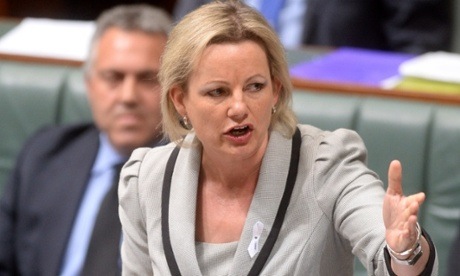
The government has shelved its controversial plan to cut Medicare rebates, after facing a political backlash and the likelihood of a Senate defeat.
The health minister, Sussan Ley, announced on Thursday that the proposed $20 cut to rebates for short consultations with GPs had been taken “off the table”.
Ley, who cut short her annual leave to deal with the backlash, said she was “deeply concerned by the misinformation that is causing confusion for patients and confusion for doctors”.
“As a result, I’m announcing today that the changes to level A and B Medicare consultation items will not commence on Monday as planned,” she said in Melbourne.
“The government is taking them off the table. However, it remains critical that we implement changes to ensure quality care for Australians and a secure future for Medicare.
Ley said she would now consult doctors and others “to come up with sensible options to deliver appropriate Medicare reform”.
The Australian Medical Association had accused Ley’s predecessor, Peter Dutton, of failing to consult GPs.
The regulation – made by Dutton before Ley assumed the health portfolio last month – would have reduced by about $20 the Medicare rebate that applied to consultations shorter than 10 minutes.
The opposition leader, Bill Shorten, announced on Wednesday he would move a disallowance motion at the earliest opportunity, a move the Greens had also flagged. Labor and the Greens appeared to have the support of at least four crossbenchers – the number required to overturn the regulation.
This raised the possibility GPs would have had to adapt to the changes for a short period before reverting to previous arrangements after the Senate veto.
Earlier on Thursday the AMA had called on the government to “bow to common sense” and withdraw the planned changes before they took effect.
The Queensland premier, Campbell Newman, who will face voters at a state election in two weeks, also distanced himself from the changes on Thursday. Newman said his Liberal National party government had raised concern with federal counterparts that the measures could drive more people into hospital emergency departments.
Even supporters of the policy argued the government should delay the start date until after the Senate vote to avoid disruption.
Terry Barnes, a former health policy adviser to Abbott and the author of a submission proposing a GP co-payment in late 2013, said the prime minister should defer the measures until March to allow a Senate vote. Barnes said such a move would allow the government to explain why the changes were needed.
The changes to rebates for short consultations were part of the government’s “plan B” for Medicare, after Abbott and Dutton conceded in December that the budget policy to introduce a co-payment would not pass the Senate.
The government also plans to cut $5 from the rebate for adult non-concession patients in July, a cost that GPs are likely to pass on. The government also intends to extend the freeze on indexation of Medicare rebates.
On Thursday Shorten visited Brisbane with his health spokeswoman, Catherine King, attempting to link Newman to the Medicare changes in the state election campaign.
The leader of the Greens, Christine Milne, said Abbott was trying to make GPs do the government’s “dirty work”.
Milne said the government should “raise money from those who can afford to pay, not the sick and vulnerable”.
“Make no mistake: if the government tries to force GPs to do their dirty work, costs will rise – there’s no doubt about that,” she said. “We are going to see less and less bulk-billing.”
